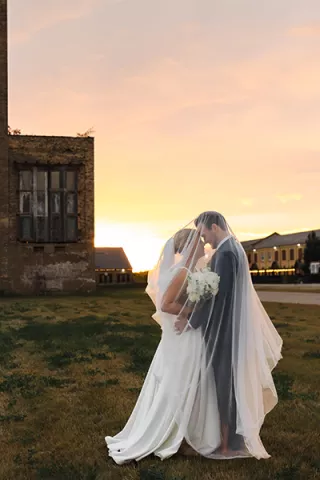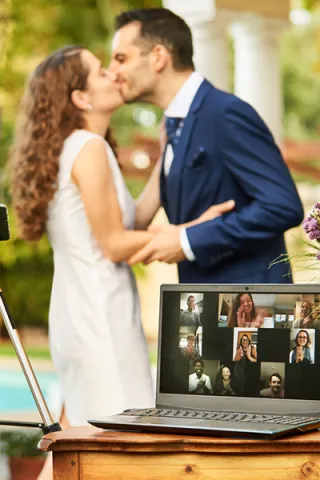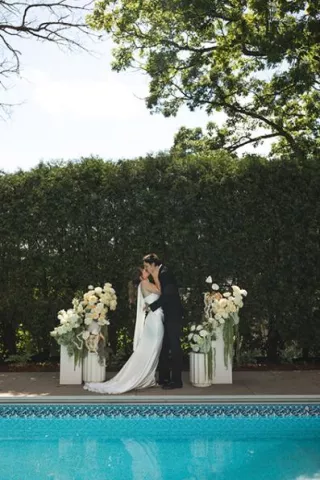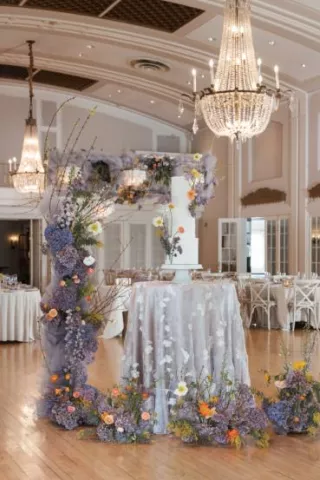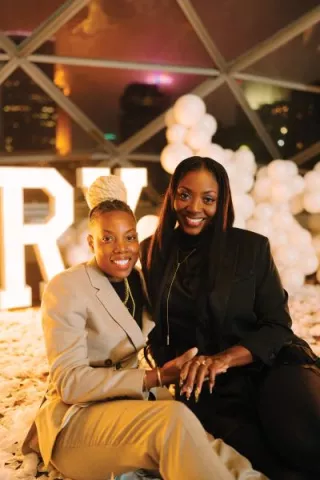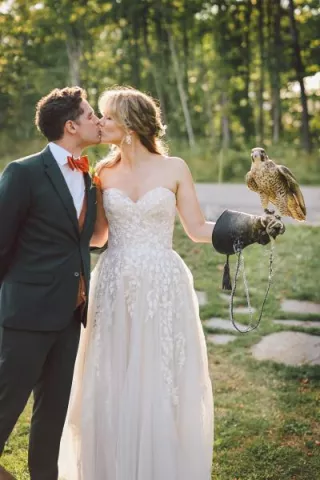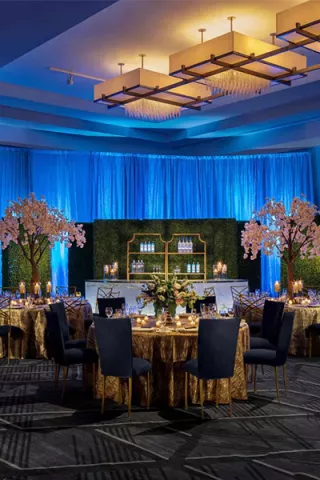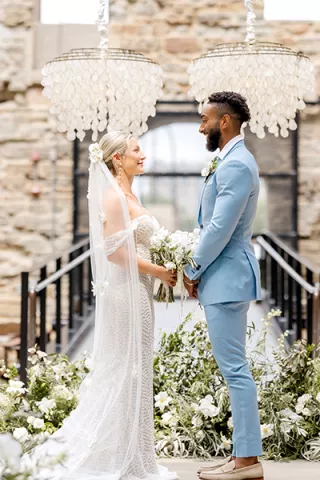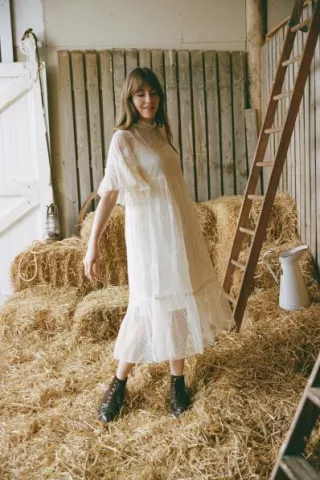With the abundance of eco-friendly options in grocery stores, malls, and restaurants, it’s become downright easy to go green. Couples everywhere are incorporating their commitment to the environment into their wedding day; they’ve discovered that you don’t have to sacrifice an ounce of elegance to make your wedding an environmentally conscious affair. From food to flowers, gowns to décor, we’ve tracked down some of the most divine ways you and your guests can say “I do” in harmony with Mother Nature.
Gowns
Every bride wants to look her best on her wedding day. You can feel your best, too, by making eco-friendly dress choices, forgoing artificial fabrics that were produced under unsafe or unjust working conditions.
For those with the greenest of desires and sentimental leanings, consider skipping the new gown altogether and revamp your mother’s or grandmother’s gown with the help of a local seamstress. Specializing in recycling fabrics, Brenda Foat, head designer of Foat Design Bridal, will incorporate all your favorite elements of the heirloom dress to create an updated wedding dress that’s custom-made for you.
Should Mom’s dress not be an option, look into vintage bridal shops. Stores such as Andrea’s Vintage and Bridal in Minneapolis carry gorgeous mint-condition dresses in one-of-a-kind styles that date back to the early 20th century. Previously worn dresses mean no extra labor, electricity, or waste was created for your gown, so you can put your energy (and all the money you’re saving) into alterations to make someone else’s beloved dress fit you like a glove.
If you have your heart set on a new gown, opt for a bridal designer who uses eco-friendly, natural fabrics. Adele Wechsler’s eco-couture collections (available at Macy’s Bridal Salon in Minneapolis) are created with remnant fabrics, vegetable-dyed silks, and certified organic hemp/silk, made by fair-trade labor, and individually hand-cut.
When all the festivities are over, make sure to clean and preserve your dress using non-hazardous chemicals. Mulberrys Garment Care in Minneapolis and St. Louis Park has experts on hand to clean gowns with purified water and non-toxic solutions; they will also mend and restore as needed (broken beading, for instance), before packaging your incipient heirloom in an acid-free box. For other Earth-friendly cleaners near you, check out greenearthcleaning.com.
Food
Make organic and local cuisine the focus of your wedding menu. Minneapolis-based favorite Chowgirls Killer Catering partners with local vendors and farmers markets to provide incredibly fresh, seasonal cuisine with impressive vegetarian and vegan options.
Common Roots Catering in Minneapolis also creates season-specific menus, serving up fresh, organic, pesticide- and hormone-free food sourced from local farmers, while offering waste-free service with reusable or compostable serveware.
Bakeries such as Madwoman Foods can accommodate requests for organic and/or gluten-free cakes that are as elegant and delicious as they are good for you (and the environment).
Flowers
When you’re choosing flowers and plants for your wedding celebrations, skip exotic, out-of-season blooms and seek out what’s on offer at nearby farms and growers. Doing so will ensure you’re supporting local business, and will also cut down on the fuel used and pollution created had the products been shipped from afar. Tell your florist or planner that you’re interested in going green, and they can make sure to source your flowers exclusively from local vendors. Len Busch Roses, based in Plymouth, is one of the Midwest’s largest floral producers, growing alstroemeria, lilies, tulips, snapdragons, gerbera daisies, and spray roses in-house and distributing them to local shops year-round.
Also consider using organic flowers. This is especially important if you’d like to add fresh flowers to your cake, as you won’t want to deal with pesticides or other chemical residue. Local florist Brown & Green Floral, for instance, works with two flower farms in Minnesota and Wisconsin to bring organic, seasonal blooms to their clients. From April through November, weddings can bask in the beauty of local zinnias, dahlias, peonies, and dogwood.
A few additional tips: To cut back on the number of flowers, take your ceremony floral arrangements to the reception site, repurposing your blooms. Also, don’t use floral foam in arrangements because it’s not biodegradable and will just sit in landfills along with styrofoam and plastics. Finally, consider using potted flowers and plants when possible; they can be given away, planted, and enjoyed long after your guests have gone home.
Stationery
Consider doing without the multi-enveloped, multi-insert wedding invitations and help save some of the millions of trees toppled every year for paper stock. If you go electronic, you can still send a paper invite if you like, but a wedding website can take care of the RSVPs. Event and invitation design company Amy Zaroff Events + Design creates custom websites for clients that match the theme of the wedding and your paper invites.
If you do decide to go with paper, use cotton, bamboo, or recycled options. Paper Depot carries 100-percent recycled papers as well as tree-free sheets made from alternative fibers such as old clothing. Botanicalpaperworks.com carries invites made from post-consumer products and wildflower seeds, so once guests have celebrated your day, they can have a lasting memory as they plant the invites. Be sure to use soy-based, non-toxic inks, which are common in letterpress printing.
Transportation
To have the greenest wedding, try to arrange for your guests to travel as little as possible, reducing the amount of transit-based emissions released into the environment. Choosing a single location for both ceremony and reception is one easy way to do this. If the ceremony site isn’t best suited for later revelry, encourage guests to carpool, or arrange for group transportation.
Also consider donating to a carbon-offsetting foundation, to help shrink your nuptials’ environmental footprint. Websites such as carbonfund.org can calculate your event’s carbon emissions from flights and long drives. Your gift will fund carbon offset programs, and support renewable energy, education efforts, and reforestation projects.
Venues
Take advantage of spaces that offer lots of intrinsic natural beauty. Hosting your ceremony at an outdoor site like a picturesque farm or in a nature-filled space like the Marjorie McNeely Conservatory will reduce your need for other décor. If more conventional spaces strike your fancy, check to see which hotels, centers, and ballrooms use energy-efficient appliances and biodegradable products. Surprisingly, few establishments recycle, so when you can, seek out venues that make eco-friendly choices. Also, use real glassware whenever possible for beverages, as any plastics are likely to end up in landfills.
Decor
Go ahead and feel good about renting those necessities such as linens, glassware, tables, and chairs. Once you’re done using them, the rental company will pass them right along to the next person, keeping the whole “recycle, reuse” cycle going strong. Consultants at companies like Midway Party Rental and AARCEE Classic Events can help you choose the best pieces to fit your green-friendly day.
Incorporate eco-friendly, nature-made, or vintage objects into your décor. Vintage vases, jars, and glassware can make for gorgeous and eclectic tabletop decorations, while found objects such as wood and stones can become elegant table numbers and place cards. Also look for products such as soy-based candles (rather than the petroleum-based wax variety).
Officiant
Think you can’t go green when it comes to choosing an officiant? Think again. Some wedding ministers will not only help you make the most heartfelt “I do’s” but will also give a little back in honor of your big day. For instance, if you use Reverend Tomkin Coleman’s services for your wedding (mnweddingminister.com/green), he’ll make a donation in your name to the nonprofit Trees for Butterflies. With each donation, 10 endangered oyamel fir trees will be planted in Michoacan, Mexico, to supply crucial habitat for tens of thousands of migrating monarch butterflies during the winter months.
After the event
Once the big event is over, what do you do with all the stuff—food, flowers, decorations, recyclables, favors—that’s left over? For a small fee, companies like Special E will come to your wedding and rescue your event leftovers, subsequently recycling, repurposing, and redirecting them to people and organizations in need, such as hospitals, churches, shelters, food banks, nursing homes, and relief agencies.
